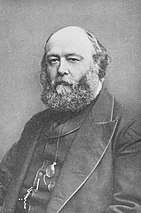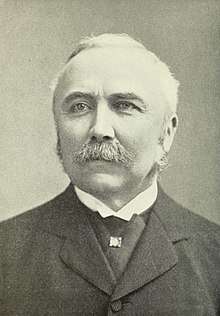1900 United Kingdom general election
The 1900 United Kingdom general election was held between 26 September and 24 October 1900, following the dissolution of Parliament on 25 September. Also referred to as the Khaki Election (the first of several elections to bear this sobriquet), it was held at a time when it was widely believed that the Second Boer War had effectively been won (though in fact it was to continue for another two years).
| |||||||||||||||||||||||||||||||||||||||||||||
All 670 seats in the House of Commons 336 seats needed for a majority | |||||||||||||||||||||||||||||||||||||||||||||
|---|---|---|---|---|---|---|---|---|---|---|---|---|---|---|---|---|---|---|---|---|---|---|---|---|---|---|---|---|---|---|---|---|---|---|---|---|---|---|---|---|---|---|---|---|---|
| |||||||||||||||||||||||||||||||||||||||||||||
 Colours denote the winning party | |||||||||||||||||||||||||||||||||||||||||||||
| |||||||||||||||||||||||||||||||||||||||||||||
The Conservative Party, led by Lord Salisbury with their Liberal Unionist allies, secured a large majority of 130 seats, despite securing only 5.6% more votes than Henry Campbell-Bannerman's Liberals. This was largely owing to the Conservatives winning 163 seats that were uncontested by others. The Labour Representation Committee, later to become the Labour Party, participated in a general election for the first time. However, it had only been in existence for a few months; as a result, Keir Hardie and Richard Bell were the only LRC Members of Parliament elected in 1900.
This was the first occasion when Winston Churchill was elected to the House of Commons. He had stood in the same seat, Oldham, at a by-election held the previous year, but had lost. It was also the final general election of the Victorian era and the 19th century.
Results
| 402 | 183 | 76 | 9 |
| Conservative & Lib. Unionist | Liberal | IPP |
| Party | Seats | Gains | Losses | Net gain/loss | Seats % | Votes % | Votes | +/− | |
|---|---|---|---|---|---|---|---|---|---|
| Conservative & Lib. Unionist | 402 | 32 | 41 | −9 | 60.1 | 50.2 | 1,637,683 | +1.0 | |
| Liberal | 183 | 38 | 32 | +6 | 27.4 | 45.1 | 1,469,500 | −0.5 | |
| Irish Parliamentary | 76 | 2 | 8 | −6 | 11.3 | 1.8 | 57,576 | −0.8 | |
| Labour Repr. Cmte. | 2 | 2 | 0 | +2 | 0.3 | 1.3 | 41,900 | N/A | |
| Independent Nationalist | 6 | 6 | 0 | +6 | 0.9 | 0.7 | 23,706 | ||
| Ind. Conservative | 0 | 0 | 0 | 0 | 0 | 0.4 | 13,713 | ||
| Independent Liberal | 1 | 1 | 0 | +1 | 0.1 | 0.2 | 6,423 | +0.1 | |
| Independent | 0 | 0 | 0 | 0 | 0 | 0.2 | 4,800 | +0.2 | |
| Scottish Workers | 0 | 0 | 0 | 0 | 0 | 0.1 | 3,107 | N/A | |
| Ind. Liberal Unionist | 0 | 0 | 0 | 0 | 0 | 0.1 | 1,855 | N/A | |
| Independent Labour | 0 | 0 | 0 | 0 | 0 | 0.0 | 433 | +0.0 | |
Voting summary
Seats summary
See also
Notes
- Contested the 1895 election as two separate parties, the Irish National League and the Irish National Party, but reunified before 1900.
- All parties with more than 1,000 votes shown.
References
- Craig, F. W. S. (1989), British Electoral Facts: 1832–1987, Dartmouth: Gower, ISBN 0900178302
- Garvin, J. L. (1934), The life of Joseph Chamberlain: Volume Three 1895–1900, London, pp. 571–92 on dissolving Parliament, pp. 593–607 on Khaki election
- Hinton, Guy (2015), "Newcastle and the Boer War: Regional Reactions to an Imperial War", Northern History, 52 (2): 272–294, doi:10.1179/0078172X15Z.00000000092
- Marsh, Peter T. (1994), Joseph Chamberlain: Entrepreneur in Politics, pp. 492–502
- Readman, Paul (2001), "The Conservative party, patriotism, and British politics: the case of the general election of 1900", Journal of British Studies, 40 (1): 107–145, doi:10.1086/386236, JSTOR 3070771
- Roberts, Andrew (1999), Salisbury: Victorian Titan, pp. 766–83


_(14587063449)_(cropped).jpg)